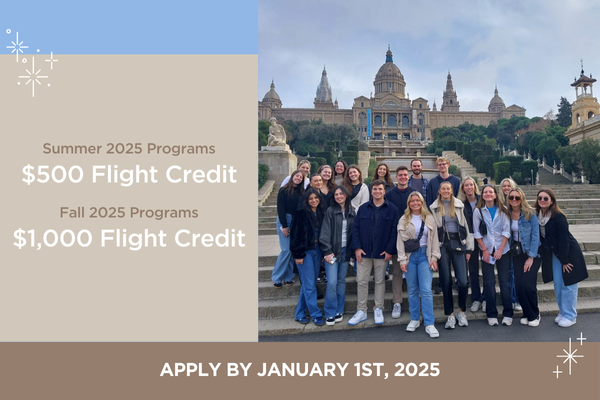The Attachment Nest: Development & Care within a Spectrum of (a)typical Socioemotional and Cognitive Development
Interdisciplinary Studies Program
Amsterdam, Netherlands
Dates: 7/5/25 - 8/2/25

The Attachment Nest: Development & Care within a Spectrum of (a)typical Socioemotional and Cognitive Development
OVERVIEW
CEA CAPA Partner Institution: Vrije Universiteit Amsterdam
Location: Amsterdam, Netherlands
Primary Subject Area: Psychology
Instruction in: English
Transcript Source: Partner Institution
Course Details: Level 300
Recommended Semester Credits: 3
Contact Hours: 44
DESCRIPTION
This summer school course provides students with an integrative and inclusive exploration of human attachment development and its multifaceted role across various settings. Renowned scholars from diverse international backgrounds will present insights gleaned from theoretical, experimental, and clinical perspectives, fostering a comprehensive understanding of the profound impact of early caregiving experiences on individuals' socioemotional and cognitive development throughout the lifespan.
Rooted in the seminal attachment theory by Bowlby (1969), the course will present the scientific endeavours of researchers from different disciplines aimed at unravelling the intricate neurobiological, cognitive and social mechanisms shaping human development. The attachment theory posits that infants construct internal working models (IWMs; Pietromonaco & Barrett, 2000), which act as rudimentary cognitive templates for future interactions, shaping expectations about the self, others, and relationships. We will trace the development and the expansion of the theory across different disciplines and learn about its applications in understanding typical and atypical development, in a cross-cultural framework.
The course unfolds through three interwoven quests:
1) Attachment Formation and Development: Delve into the contextual nuances of attachment within the realms of parenting and dyadic/triadic interactions.
2) Cross-Cultural Considerations and Assessment: Explore the assessment of attachment at different developmental stages and across diverse cultures, emphasizing the cross-cultural validity of the theory.
3) Implications and Applications of Attachment Theory: Investigate attachment-based interventions, particularly for individuals with intellectual disabilities, and explore the integration of technology to support implementation and delivery.
Students will be taught through lectures, discussions and workshops.
Thanks to our interdisciplinary (inter)national collaborations with clinicians and researchers, we can offer students access to an extensive network of partners and experts in the field of attachment and disability. In group discussions and debates, we will invite you to think critically about the theory and its clinical applications. Your learning experience will be further enriched through thought-provoking lectures with renowned scholars in the field. You will have the opportunity to network with scholars at different levels of their careers from juniors to seniors, as well as peers through group project work
The grade of this course will be based on a presentation and an essay.
Time distribution
Mornings: 8 lectures of 2h each
Noon/Mid-afternoon: 8 discussions of 1.5h each
Noon/Mid-afternoon: 2 workshops of 1.5h each
Afternoon: 4 group (self-organized) meetings
Presentations from groups 4 presentations * 5 students
Excursions to lab facilities and care centres for individuals with disabilities
Contact hours listed under a course description may vary due to the combination of lecture-based and independent work required for each course. CEA CAPA's recommended credits are based on the contact hours assigned by Vrije Universiteit Amsterdam (VU Amsterdam): 15 contact hours equals 1 U.S. credit
Rooted in the seminal attachment theory by Bowlby (1969), the course will present the scientific endeavours of researchers from different disciplines aimed at unravelling the intricate neurobiological, cognitive and social mechanisms shaping human development. The attachment theory posits that infants construct internal working models (IWMs; Pietromonaco & Barrett, 2000), which act as rudimentary cognitive templates for future interactions, shaping expectations about the self, others, and relationships. We will trace the development and the expansion of the theory across different disciplines and learn about its applications in understanding typical and atypical development, in a cross-cultural framework.
The course unfolds through three interwoven quests:
1) Attachment Formation and Development: Delve into the contextual nuances of attachment within the realms of parenting and dyadic/triadic interactions.
2) Cross-Cultural Considerations and Assessment: Explore the assessment of attachment at different developmental stages and across diverse cultures, emphasizing the cross-cultural validity of the theory.
3) Implications and Applications of Attachment Theory: Investigate attachment-based interventions, particularly for individuals with intellectual disabilities, and explore the integration of technology to support implementation and delivery.
Students will be taught through lectures, discussions and workshops.
Thanks to our interdisciplinary (inter)national collaborations with clinicians and researchers, we can offer students access to an extensive network of partners and experts in the field of attachment and disability. In group discussions and debates, we will invite you to think critically about the theory and its clinical applications. Your learning experience will be further enriched through thought-provoking lectures with renowned scholars in the field. You will have the opportunity to network with scholars at different levels of their careers from juniors to seniors, as well as peers through group project work
The grade of this course will be based on a presentation and an essay.
Time distribution
Mornings: 8 lectures of 2h each
Noon/Mid-afternoon: 8 discussions of 1.5h each
Noon/Mid-afternoon: 2 workshops of 1.5h each
Afternoon: 4 group (self-organized) meetings
Presentations from groups 4 presentations * 5 students
Excursions to lab facilities and care centres for individuals with disabilities
Contact hours listed under a course description may vary due to the combination of lecture-based and independent work required for each course. CEA CAPA's recommended credits are based on the contact hours assigned by Vrije Universiteit Amsterdam (VU Amsterdam): 15 contact hours equals 1 U.S. credit








